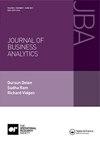Short-term prediction of opioid prescribing patterns for orthopaedic surgical procedures: a machine learning framework
IF 1.6
Q3 COMPUTER SCIENCE, INFORMATION SYSTEMS
引用次数: 0
Abstract
ABSTRACT Overprescribing of opioids after surgical procedures can increase the risk of addiction in patients, and under prescribing can lead to poor quality of care. In this study, we propose a machine learning-based predictive framework to identify the varying effects of factors that are related to the opioid prescription amount after orthopaedic surgery. To predict the prescription classes, we train multiple classifiers combined with random and SMOTE over-sampling and weight-balancing techniques to cope with the imbalance state of the dataset. Our results show that the gradient boosting machines (XGB) with SMOTE achieve the highest classification accuracy. Our proposed analytical framework can be employed to assist and therefore, enable the surgeons to determine the timely changing effects of these variables.骨科手术过程中阿片类药物处方模式的短期预测:机器学习框架
手术后过量开具阿片类药物会增加患者成瘾的风险,而处方不足会导致护理质量差。在这项研究中,我们提出了一个基于机器学习的预测框架,以识别与骨科手术后阿片类药物处方量相关的因素的不同影响。为了预测处方类,我们结合随机和SMOTE过采样和权重平衡技术训练了多个分类器,以应对数据集的不平衡状态。结果表明,使用SMOTE的梯度增强机(XGB)达到了最高的分类精度。我们提出的分析框架可以帮助外科医生及时确定这些变量变化的影响。
本文章由计算机程序翻译,如有差异,请以英文原文为准。
求助全文
约1分钟内获得全文
求助全文
来源期刊

Journal of Business Analytics
Business, Management and Accounting-Management Information Systems
CiteScore
2.50
自引率
0.00%
发文量
13
 求助内容:
求助内容: 应助结果提醒方式:
应助结果提醒方式:


